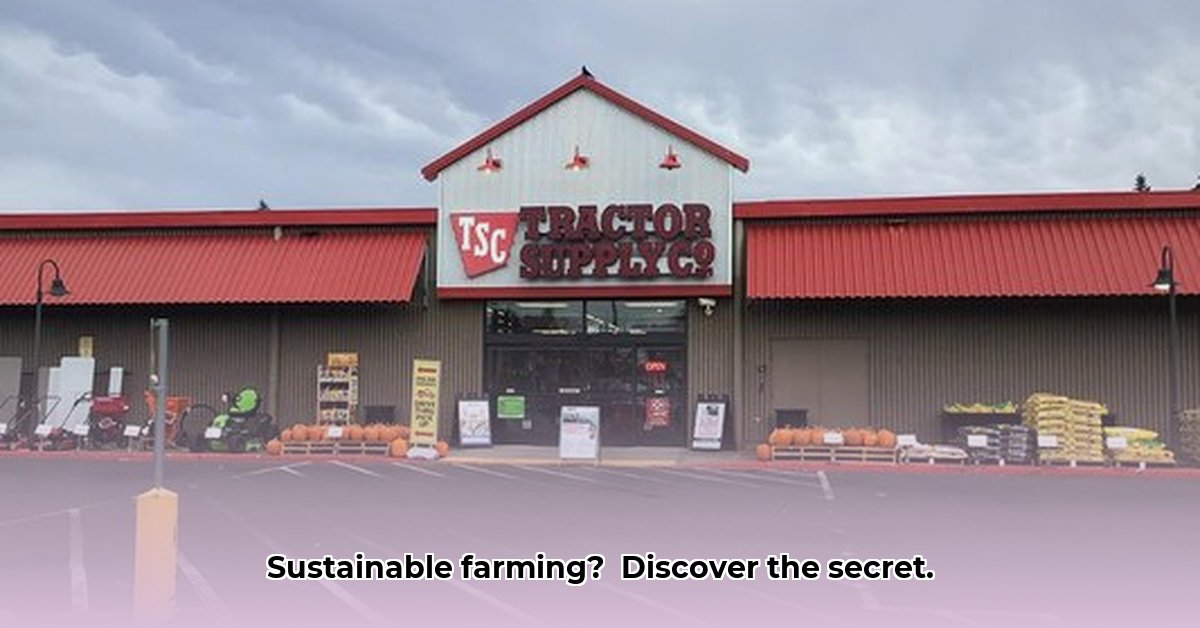
Assessing Tractor Supply's Role in Sustainable Agriculture in Kitsap County
Port Orchard Tractor Supply (PTS) serves as a vital resource for farmers and gardeners across Kitsap County, Washington, including communities like Retsil, Manchester, and Bremerton. Its extended hours, particularly the 8 am to 9 pm Monday schedule, cater to the busy schedules of those relying on its supplies. This convenience significantly benefits smaller farms and home gardeners who might lack the resources to travel farther for essential materials. However, a comprehensive evaluation requires examining PTS's environmental footprint, supply chain practices, and overall contribution to sustainable agriculture in the region. For more on sustainable farming practices, check out this helpful resource: Simple Chicken Tractor.
The Environmental Impact of Convenience: A Closer Look
While PTS offers undeniable convenience, a critical analysis necessitates a deeper understanding of its environmental impact. Questions regarding product sourcing (local vs. national/international), waste management strategies, and active support of sustainable farming practices beyond product sales require thorough investigation. The store’s accessibility is beneficial, but the sustainability of its entire supply chain demands further scrutiny. A balanced assessment considers both the immediate benefits of convenience and the long-term implications for the environment and the community's agricultural future. How does PTS's carbon footprint compare to other regional agricultural suppliers? This data is crucial for informed decision-making.
Sustainable Choices: Transparency and Informed Purchasing Decisions
Transparency is paramount. Farmers and consumers need access to clear information about PTS's product sourcing and commitment to sustainable practices. Does PTS offer organic seeds and locally-produced fertilizers? Are there clear labeling standards to help consumers identify eco-friendly options? The availability of such information is directly tied to a customer's ability to make informed choices that support sustainable agriculture. What concrete steps is PTS taking to measure and reduce its environmental impact? Concrete data, such as carbon footprint reduction targets and waste diversion rates, helps assess the company's genuine commitment to sustainability.
Fostering a Sustainable Future: Collaboration and Community Engagement
A truly sustainable future for Kitsap County’s agriculture sector requires collaboration among various stakeholders. Imagine a scenario where PTS actively engages with local programs, providing educational resources and promoting environmentally conscious farming practices. This collaborative approach could transform PTS into a hub for sustainable agriculture, fostering a stronger, self-sustaining local food system. Involving local policymakers can also improve access to resources that directly support local agricultural businesses and reduce reliance on extensive transportation networks. What innovative partnerships could maximize the positive impact of PTS on local sustainability initiatives?
Collaborative Action: Steps Towards a Greener Agricultural Landscape
Achieving a more sustainable agricultural future in Kitsap County demands a multifaceted strategy involving several key stakeholders:
Tractor Supply Company: Conduct thorough life-cycle assessments of products, prioritizing sustainable sourcing and transparent reporting of environmental impact metrics. Actively invest in waste reduction and recycling programs.
Local Farmers and Gardeners: Prioritize the purchase of locally sourced, organically certified products whenever possible. Adopt water-efficient and low-impact agricultural practices.
Local Government/County Officials: Support sustainable agricultural initiatives through funding or policy changes. Promote collaboration between PTS and local sustainable agriculture programs.
Consumers: Make informed purchasing decisions by selecting eco-friendly products whenever feasible. Support businesses committed to sustainable practices.
Conclusion: Building a Sustainable Community Together
The success of PTS and the sustainability of Kitsap County's agriculture are deeply interconnected. By fostering collaboration among farmers, the store, local government, and consumers, the community can build a more robust and environmentally responsible agricultural system. This requires transparent communication, shared commitment to sustainable practices, and a willingness to adapt strategies based on ongoing monitoring and evaluation. The long-term health of the local ecosystem and food supply depends on this collaborative approach.